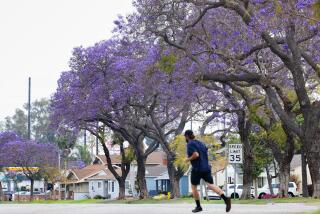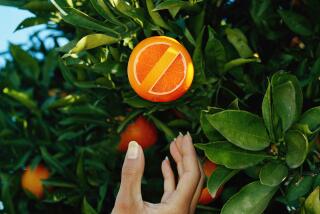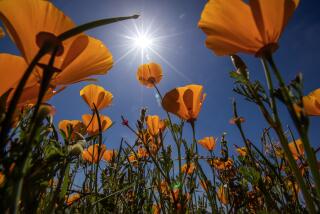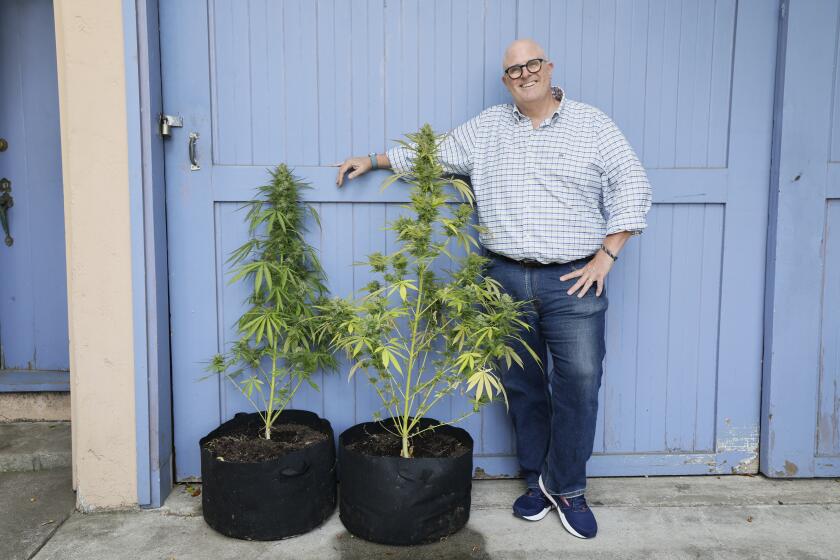Fruits’ Arrival Is Late, but Plentiful
Peaches, plums, apricots, and nectarines are making later appearances than usual this year because of cool weather last spring. Locally grown stone fruit is in plentiful supply and will remain so until mid-August.
A row of trees laden with ripe, summer fruit lines the edge of the Hata family farm in Valley Center. Owner Kaz Hata’s crop ripened later than usual this year, but there are enough peaches, plums and apricots on his trees to supply flocks of hungry sparrows, as well as Hata’s farm-stand customers.
“This is the best-tasting,” said the soft-spoken Hata, as he gently twists a ripe Babcock peach from its limb. Bushes of twisted junipers, left over from Hata’s former landscaping career, grow in the shadow of his more recently planted Satsuma plums and nectarines. A few remaining apricots are hidden among the leaves of the Moorpark and Royal apricot trees, two varieties Hata favors for their sweet flesh and juiciness.
If you plan on making jams or jellies with fresh stone fruit, don’t delay, advises Laney Villalobos of the Big Orange fruit stand at the foot of Palomar Mountain. Peaches and plums are at their peak; apricots nearly finished.
Villalobos and her husband, Lano, grow six varieties of nectarines alone, some green, others red. “Some are so red and huge that customers constantly ask me if they’re plums,” she says.
Since turning to drip, or “leaky-pipe” irrigation, Villalobos has noticed a drastic improvement in the yield of certain trees. “Some of our 2-year-old nectarines trees are producing more than the ones planted 10 years ago,” she says.
Among the four kinds of peaches she grows, Villalobos singles out the white-fleshed Babcock as her favorite. “I wait for it all year” she said. “It’s a variety that’s hardly ever seen in stores because, if you pick it ripe, it has a shelf life of one day.”
The Big Orange also features Santa Rosa plums, as well as red Satsuma, both well-suited to making jams and jellies.
Maria Erlandson, whose husband Carl is the president of the North County chapter of California Rare Fruit Growers Assn., prefers the Sprite plum, which yields slightly to the touch when it is ripe. “It’s small, and just the right size. It does very well in our Escondido climate,” she says. Erlandson, who constantly experiments with exotic fruit and vegetables, also grows Weeping Santa Rosa, with branches that hang low to the ground like a willow tree’s.
Her orchard is filled with other unusual varieties such as the sweet Burgundy plum, with its dark purple flesh, and the baseball-sized Queen Anne, which, according to her, is ideal for making jam. Most of Erlandson’s regular customers make it a point to arrive early at the farmer’s market to pick up a basket or two of her tree-ripened fruit.
When buying, look for fruit that is plump and wrinkle-free. Peaches and plums are best preserved in a paper bag. Loosely close the bag, and leave it at room temperature to encourage the ripening process. Enjoy right away, or store the ripened fruit in the refrigerator for a few days.
Don’t discard overripe peaches, apricots or plums: They make great shakes when blended with milk, vanilla yogurt, or ice cream.
Hata Family Farm, 30763 Valley Center Road, Valley Center, Ca. 92082. 749-2789. Sells from farm-stand and at Vista Farmer’s Market. Fruit is $1 a basket.
Laney Villalobos, the Big Orange, 17166 Highway 76, Pauma Valley, Ca. 92061. 742-1471. Stand open Friday through Sunday from 9:30 a.m. to dusk. All fruit, 50 cents a pound. Call ahead for special orders.
Carl and Maria Erlandson. (619) 741-8874. Basket of apricots (about 25) $1 at Vista Farmer’s Market.






